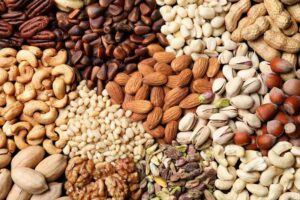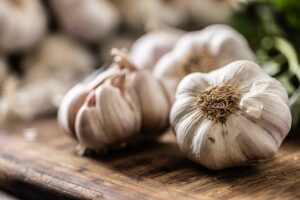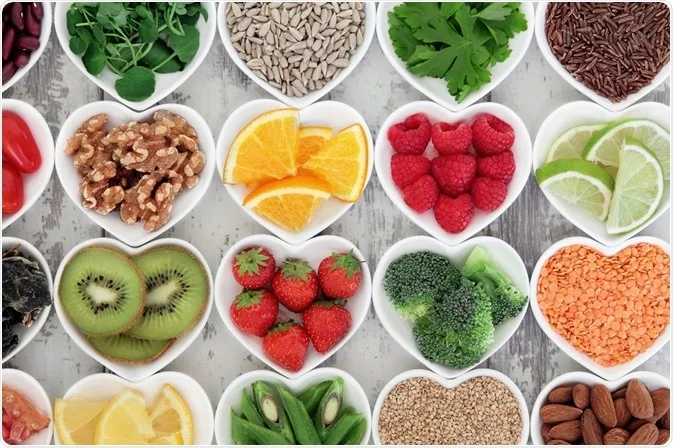Diabetes can be challenging, but the good news is that the food choices we make can play a crucial role in managing and even reversing this condition. In this blog, we will explore the fascinating world of diabetes cure foods and how they can become powerful allies in your journey towards better health. From understanding the benefits of these foods to incorporating them into your daily meals, we’re here to provide you with valuable insights and practical tips that can make a significant difference in managing diabetes.
List Of Best 17 Diabetes Cure Foods
 While it’s important to note that there is no single “cure” for diabetes, certain foods can contribute to better blood sugar control and overall health. Here are 17 diabetes-friendly foods that are known for their potential benefits:
While it’s important to note that there is no single “cure” for diabetes, certain foods can contribute to better blood sugar control and overall health. Here are 17 diabetes-friendly foods that are known for their potential benefits:
Leafy Greens
Leafy greens such as spinach, kale, and Swiss chard are nutritional powerhouses that offer a plethora of health benefits, particularly for those managing diabetes. Rich in essential vitamins, minerals, and antioxidants, these greens contribute to overall well-being. Additionally, their low carbohydrate content makes them an excellent choice for maintaining stable blood sugar levels. Whether added to salads, sautéed as a side dish, or blended into smoothies, leafy greens are a versatile and diabetes-friendly addition to your diet.
Berries
Berries, including blueberries, strawberries, and raspberries, are not only delicious but also packed with antioxidants, fiber, and essential vitamins. The high fiber content helps slow down the absorption of sugars, making them a smart choice for individuals with diabetes. Berries can be enjoyed on their own, mixed into yogurt, or added to oatmeal, providing a naturally sweet and nutritious option that won’t spike blood sugar levels.
Fatty Fish
Fatty fish like salmon, mackerel, and sardines are rich sources of omega-3 fatty acids, known for their anti-inflammatory properties. These healthy fats may contribute to improved insulin sensitivity and heart health, making them beneficial for individuals managing diabetes. Including fatty fish in your diet, whether grilled, baked, or in salads, can provide essential nutrients and support overall well-being.
Nuts and Seeds
 Almonds, walnuts, chia seeds, and flaxseeds are nutritional powerhouses that offer a mix of healthy fats, fiber, and essential nutrients. These snacks not only provide a satisfying crunch but also contribute to satiety and blood sugar stability. Incorporating a handful of nuts or seeds into your daily routine—whether sprinkled on yogurt, added to salads, or enjoyed as a snack—can be a smart choice for individuals with diabetes.
Almonds, walnuts, chia seeds, and flaxseeds are nutritional powerhouses that offer a mix of healthy fats, fiber, and essential nutrients. These snacks not only provide a satisfying crunch but also contribute to satiety and blood sugar stability. Incorporating a handful of nuts or seeds into your daily routine—whether sprinkled on yogurt, added to salads, or enjoyed as a snack—can be a smart choice for individuals with diabetes.
Whole Grains
Whole grains like quinoa, barley, and brown rice are rich in fiber and have a lower glycemic index compared to refined grains. The fiber content helps regulate blood sugar levels, providing a sustained release of energy. Including these whole grains in your meals, whether as a side dish or a base for stir-fries and salads, can be a nutritious and diabetes-friendly choice.
Beans and Legumes
Lentils, chickpeas, and black beans are excellent sources of both protein and fiber, making them valuable components of a diabetes-friendly diet. The combination of protein and fiber promotes satiety and helps stabilize blood sugar levels. Whether incorporated into soups, stews, or salads, beans and legumes are versatile ingredients that contribute to overall nutritional balance.
Greek Yogurt
Greek yogurt is a protein-rich dairy option that can be beneficial for individuals with diabetes. Opting for plain, unsweetened varieties ensures a lower carbohydrate intake, while the protein content supports satiety. Enjoying Greek yogurt as a snack or incorporating it into smoothies and desserts provides a tasty and nutritious addition to a diabetes-friendly diet.
Cinnamon
Cinnamon, a popular spice with a distinctive flavor, has been associated with potential benefits for individuals with diabetes. Studies suggest that cinnamon may improve insulin sensitivity, helping to regulate blood sugar levels. Sprinkling cinnamon on oatmeal, or yogurt, or incorporating it into baking can add a flavorful twist to your meals while potentially offering positive effects on blood sugar control.
Turmeric
Turmeric, a vibrant yellow spice, contains curcumin, a compound with potent anti-inflammatory properties. While research is ongoing, there is evidence to suggest that curcumin may benefit individuals with diabetes by improving insulin sensitivity and reducing inflammation. Integrating turmeric into your cooking, whether in curries, soups, or golden milk, not only adds a warm and earthy flavor but also introduces potential health benefits to your diabetes-friendly diet.
Broccoli
Broccoli is a cruciferous vegetable that boasts an impressive nutritional profile, making it an excellent choice for those managing diabetes. Rich in fiber, vitamins, and antioxidants, broccoli supports overall health and can be a valuable addition to a diabetes-friendly diet. Whether steamed, roasted, or added to stir-fries, incorporating broccoli into your meals contributes to a nutrient-dense and satisfying eating plan.
Avocado
Avocado is a unique fruit known for its creamy texture and healthy monounsaturated fats. While it’s higher in calories, the fats in avocados may support improved insulin sensitivity. Including avocados in salads, sandwiches, or as a flavorful topping can add richness to your meals while providing essential nutrients and potential benefits for individuals with diabetes.
Garlic
 Beyond its culinary uses, garlic has been linked to potential health benefits, including positive effects on blood sugar levels. While more research is needed, garlic’s anti-inflammatory properties and potential to improve insulin sensitivity make it an intriguing addition to a diabetes-friendly diet. Incorporating fresh garlic into savory dishes, sauces, and marinades can enhance flavor while potentially contributing to better blood sugar control.
Beyond its culinary uses, garlic has been linked to potential health benefits, including positive effects on blood sugar levels. While more research is needed, garlic’s anti-inflammatory properties and potential to improve insulin sensitivity make it an intriguing addition to a diabetes-friendly diet. Incorporating fresh garlic into savory dishes, sauces, and marinades can enhance flavor while potentially contributing to better blood sugar control.
Olive Oil
Extra virgin olive oil is a staple of the Mediterranean diet and is celebrated for its heart-healthy monounsaturated fats. This oil contains antioxidants and anti-inflammatory properties that may support overall health, including benefits for individuals with diabetes. Using olive oil in cooking, as a salad dressing, or for drizzling over vegetables provides a flavorful and health-conscious choice for those managing their blood sugar levels.
Eggs
Eggs are a versatile and nutrient-dense food that can be part of a balanced diet for individuals with diabetes. Rich in high-quality protein, vitamins, and minerals, eggs contribute to satiety and can be prepared in various ways. Whether boiled, scrambled, or used in omelets, incorporating eggs into your meals provides essential nutrients and supports a diabetes-friendly eating plan.
Tomatoes
Tomatoes, whether fresh or in the form of sauces and purees, offer a range of health benefits. Rich in lycopene, an antioxidant with potential cardiovascular benefits, tomatoes can be a valuable addition to a diabetes-friendly diet. Enjoy them in salads, salsas, or as a base for sauces to add flavor and potential health perks to your meals.
Sweet Potatoes
Sweet potatoes are a nutrient-dense alternative to regular potatoes, offering a rich source of fiber, vitamins, and minerals. With a lower glycemic index compared to white potatoes, sweet potatoes provide sustained energy and can be part of a diabetes-friendly diet. Roasting, mashing, or incorporating them into soups and stews are delicious ways to enjoy the nutritional benefits of sweet potatoes.
Green Tea
Green tea, celebrated for its antioxidant properties, may offer various health benefits, including potential positive effects on insulin sensitivity. While it’s not a cure, incorporating green tea into your beverage choices provides a low-calorie and hydrating option that aligns with a diabetes-friendly lifestyle. Enjoy it hot or cold to reap the potential benefits of this ancient beverage. As always, moderation is key.
Remember, it’s essential to consider portion sizes and overall dietary balance. Additionally, individual responses to foods may vary. So, it’s advisable to consult with a healthcare professional or a registered dietitian for personalized guidance based on your specific health needs and goals.
Benefits Of Diabetes Cure Food
 Adopting a diet focused on diabetes-friendly foods can offer numerous benefits for individuals managing diabetes. Here are some key benefits of incorporating diabetes cure foods into your lifestyle:
Adopting a diet focused on diabetes-friendly foods can offer numerous benefits for individuals managing diabetes. Here are some key benefits of incorporating diabetes cure foods into your lifestyle:
- Blood Sugar Regulation
Diabetes-friendly foods are selected for their ability to help regulate blood sugar levels. These foods often have a lower glycemic index and provide a more gradual release of glucose into the bloodstream, preventing sharp spikes in blood sugar.
- Improved Insulin Sensitivity
Certain foods, such as those rich in omega-3 fatty acids, antioxidants, and anti-inflammatory compounds, may contribute to improved insulin sensitivity. This can enhance the body’s ability to utilize insulin effectively for better blood sugar control.
- Heart Health
Many diabetes cure foods, such as fatty fish, nuts, and olive oil, are known for their heart-healthy properties. These foods can help lower cholesterol levels, reduce inflammation, and support overall cardiovascular health—crucial for individuals with diabetes who often have an increased risk of heart disease.
- Increased Fiber Intake
Foods recommended for diabetes management are often rich in dietary fiber. Fiber helps slow the absorption of sugar, promotes a feeling of fullness, and supports digestive health. This can contribute to better weight control and improved blood sugar management.
- Nutrient-Dense Nutrition
Diabetes cure foods are typically rich in essential nutrients such as vitamins, minerals, and antioxidants. These nutrients play a crucial role in supporting overall health, including immune function, skin health, and the proper functioning of various bodily systems.
- Stable Energy Levels
Choosing complex carbohydrates and incorporating protein-rich foods can contribute to more stable and sustained energy levels throughout the day. This helps prevent energy crashes and supports overall well-being.
- Reduced Inflammation
Many diabetes-friendly foods, including fatty fish, turmeric, and leafy greens, have anti-inflammatory properties. Chronic inflammation is linked to various health issues. And reducing it can positively impact overall health and diabetes management.
It’s important to note that individual responses to specific foods may vary. So, dietary recommendations should be tailored to personal health needs. Consultation with registered dietitians is crucial for creating a personalized and effective diabetes management plan.
Conclusion
In conclusion, adopting a diabetes-friendly diet, rich in nutrient-dense foods like leafy greens, berries, fatty fish, and whole grains, can bring about numerous benefits for individuals managing diabetes. These foods help regulate blood sugar levels. And also contributes to improved insulin sensitivity, heart health, and weight management. The emphasis on fiber-rich options, antioxidants, and anti-inflammatory compounds provides stable energy, reduces inflammation, and supports overall well-being.
Beyond the physical benefits, a diabetes cure foods approach empowers individuals to take control of their health, fostering a positive mindset and a sense of well-being. While it’s essential to consult with healthcare professionals for personalized guidance. Ultimately, making informed and intentional choices about the foods.

